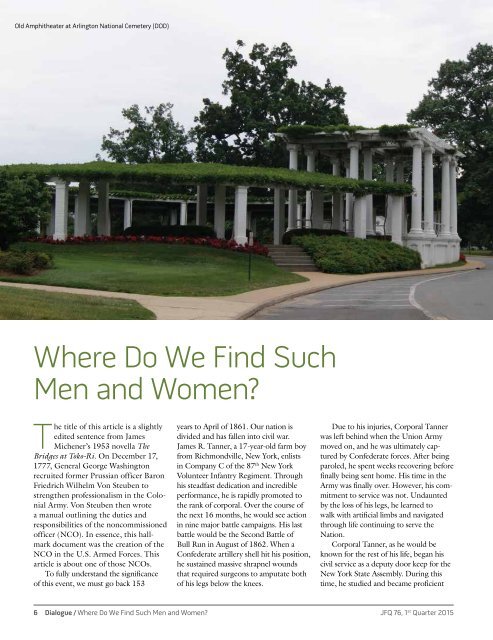jfq-76
jfq-76
jfq-76
You also want an ePaper? Increase the reach of your titles
YUMPU automatically turns print PDFs into web optimized ePapers that Google loves.
Old Amphitheater at Arlington National Cemetery (DOD)<br />
Where Do We Find Such<br />
Men and Women?<br />
The title of this article is a slightly<br />
edited sentence from James<br />
Michener’s 1953 novella The<br />
Bridges at Toko-Ri. On December 17,<br />
1777, General George Washington<br />
recruited former Prussian officer Baron<br />
Friedrich Wilhelm Von Steuben to<br />
strengthen professionalism in the Colonial<br />
Army. Von Steuben then wrote<br />
a manual outlining the duties and<br />
responsibilities of the noncommissioned<br />
officer (NCO). In essence, this hallmark<br />
document was the creation of the<br />
NCO in the U.S. Armed Forces. This<br />
article is about one of those NCOs.<br />
To fully understand the significance<br />
of this event, we must go back 153<br />
years to April of 1861. Our nation is<br />
divided and has fallen into civil war.<br />
James R. Tanner, a 17-year-old farm boy<br />
from Richmondville, New York, enlists<br />
in Company C of the 87 th New York<br />
Volunteer Infantry Regiment. Through<br />
his steadfast dedication and incredible<br />
performance, he is rapidly promoted to<br />
the rank of corporal. Over the course of<br />
the next 16 months, he would see action<br />
in nine major battle campaigns. His last<br />
battle would be the Second Battle of<br />
Bull Run in August of 1862. When a<br />
Confederate artillery shell hit his position,<br />
he sustained massive shrapnel wounds<br />
that required surgeons to amputate both<br />
of his legs below the knees.<br />
Due to his injuries, Corporal Tanner<br />
was left behind when the Union Army<br />
moved on, and he was ultimately captured<br />
by Confederate forces. After being<br />
paroled, he spent weeks recovering before<br />
finally being sent home. His time in the<br />
Army was finally over. However, his commitment<br />
to service was not. Undaunted<br />
by the loss of his legs, he learned to<br />
walk with artificial limbs and navigated<br />
through life continuing to serve the<br />
Nation.<br />
Corporal Tanner, as he would be<br />
known for the rest of his life, began his<br />
civil service as a deputy door keep for the<br />
New York State Assembly. During this<br />
time, he studied and became proficient<br />
6 Dialogue / Where Do We Find Such Men and Women? JFQ <strong>76</strong>, 1 st Quarter 2015




